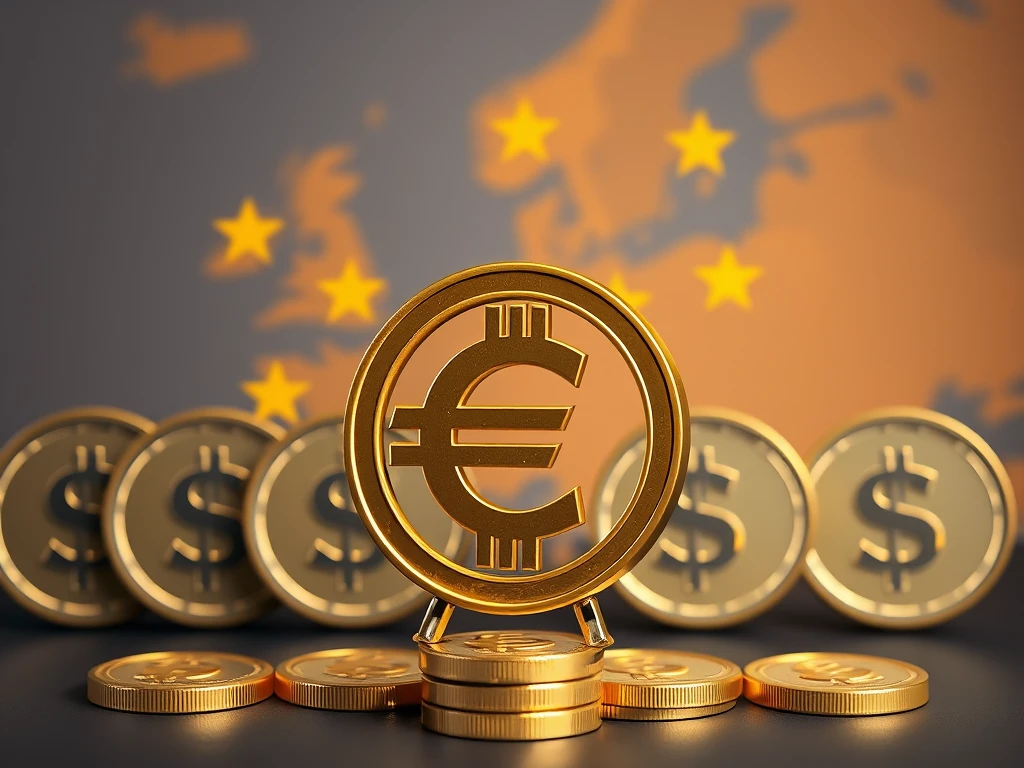Urgent Push: Digital Euro to Safeguard Europe from Stablecoin Surge

In a bold move to assert financial independence, the European Central Bank (ECB) is doubling down on its efforts to launch a digital euro. A top ECB executive has voiced strong concerns about the escalating adoption of stablecoins, particularly those pegged to the US dollar, across Europe. The solution? A sovereign digital euro designed to reign in the influence of these foreign-backed digital currencies and protect the Eurozone’s financial autonomy.
Why the ECB is Sounding the Alarm on Stablecoin Growth?
Piero Cipollone, a member of the ECB’s executive board, recently published an article emphasizing the risks associated with the increasing popularity of US dollar-linked stablecoins. He argues that relying heavily on foreign payment solutions, including these stablecoins, poses a direct threat to Europe’s monetary sovereignty. This isn’t just about market share; it’s about control over the financial arteries of the Eurozone. Cipollone paints a picture where inaction could lead to:
- Erosion of Monetary Sovereignty: Over-reliance on non-European entities for payment systems weakens the ECB’s control over monetary policy.
- Data and Fee Losses: European transactions increasingly processed by foreign firms lead to revenue and valuable data flowing outside the Eurozone.
- Capital Flight Risk: Euro deposits could migrate to the US, further strengthening the dollar’s global dominance at the expense of the euro.
- Increased Dollarization: The role of the dollar in international payments could be amplified, diminishing the euro’s standing.
These are not just hypothetical concerns. The ECB views the rising tide of stablecoin adoption as a tangible challenge to the Eurozone’s financial stability and autonomy. The urgency in Cipollone’s tone is unmistakable: the time to act is now.
The Digital Euro: Europe’s Answer to Stablecoin Dominance?
The ECB’s proposed digital euro is positioned as a strategic tool to counter the growing influence of US dollar-backed stablecoins. Cipollone explicitly states that a CBDC would “limit the potential for foreign currency stablecoins to become a common medium of exchange within the euro area.” This isn’t about stifling innovation, but rather about ensuring a level playing field and safeguarding European interests. The digital euro is envisioned as:
- A Sovereign European Payment Method: Built on EU legislation, it would be a truly European alternative in the digital payment landscape.
- A Cornerstone of Public-Private Partnership: The ECB sees it as a foundation for collaboration between public and private sectors to maintain financial sovereignty.
- A Counter to Foreign Dominance: It aims to reduce dependence on non-European payment systems and providers, including stablecoin issuers and international card schemes.
The ECB believes the digital euro is not just a technological upgrade but a necessary step to protect Europe’s financial future in an increasingly digital world. It’s about ensuring that Europe remains in control of its financial destiny, rather than becoming overly reliant on systems controlled from outside the Eurozone.
Cash vs. Digital Euro: Complementary or Competing in Europe?
Interestingly, Cipollone also emphasizes the importance of cash, calling it a “cornerstone of the European financial system” and the “only sovereign means of payment.” He acknowledges cash’s crucial role in financial inclusion and resilience. However, he points out a key limitation: cash cannot be used online, a domain increasingly dominated by digital payments. With online retail now representing a significant portion of European transactions, the reliance on non-European payment systems becomes unavoidable when cash is not an option online and European digital alternatives are lacking.
This highlights a nuanced perspective from the ECB. They are not seeking to replace cash with the digital euro. Instead, they see the digital euro as a complementary solution, extending sovereign European payment options into the digital realm where cash cannot reach. The goal is to offer a European digital payment alternative that can compete with foreign systems and stablecoins, ensuring choice and sovereignty in both the physical and digital economies.
Challenges and Skepticism Surrounding the Digital Euro in Europe
Despite the ECB’s push, the proposed digital euro is not without its hurdles. Public skepticism, particularly concerning data privacy, remains a significant challenge. Recent ECB working papers indicate that many European consumers are not convinced of the digital euro’s value proposition. Overcoming this skepticism is crucial for the digital euro’s success. Key challenges include:
- Data Privacy Concerns: Europeans are highly sensitive to data privacy, and ensuring the digital euro meets these expectations is paramount.
- Demonstrating Value to Consumers: The ECB needs to clearly articulate the benefits of the digital euro for everyday users to drive adoption.
- Regulatory Hurdles: Establishing the legal framework for the digital euro and its interaction with existing financial regulations is a complex process.
- Technological Implementation: Developing a robust, secure, and user-friendly digital euro system requires significant technological expertise and investment.
The ECB faces an uphill battle in convincing European citizens of the digital euro’s merits and addressing their legitimate concerns. However, from the ECB’s perspective, the strategic imperative of maintaining monetary sovereignty in the face of growing stablecoin adoption makes the digital euro a critical project for Europe’s financial future.
Conclusion: A Sovereign Digital Future for Europe?
The ECB’s renewed push for a digital euro signals a decisive move to shape Europe’s digital financial landscape. Driven by concerns over the rising influence of US dollar-backed stablecoins and the imperative to maintain monetary sovereignty, the ECB is positioning the digital euro as a vital tool for Europe’s financial autonomy. While challenges and public skepticism persist, the ECB’s message is clear: a digital euro is not just desirable, but increasingly necessary to safeguard Europe’s financial future in the digital age. The coming months and years will be critical in determining whether this ambitious project can overcome its hurdles and deliver on its promise of a sovereign European digital currency.






